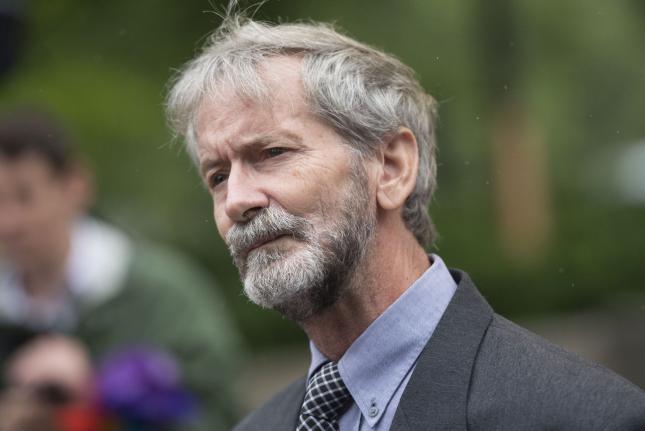WASHINGTON — The man who landed a gyrocopter on the U.S. Capitol grounds this spring as a protest against the influence of money in politics appeared in federal court on Wednesday, rejecting yet another plea deal because it would have involved jail time.
The second deal of the case would have required Douglas Hughes, of Ruskin, Florida, to spend 10 months in jail, very similar to the first deal he rejected. Hughes said he would accept a plea deal only if there was no jail time involved.
“They want to lock me up and put me away,” he said after the hearing.
Hughes landed the gyrocopter on the Capitol grounds to protest campaign finance laws and to “fight against the billions of dollars of special interest money that dominates this city.”
On July 4, Hughes was fired from the U.S. Postal Service and is applying for food stamps, he said after his court appearance, but he still hopes to fight for campaign finance reform and organize nationwide public demonstrations.
“If they want to have a circus,” Hughes said, “I’m going to bring elephants.”
Hughes argued that his gyrocopter protest was not as severe a threat as the government has suggested. The difficulty of coming to agreement on a plea deal lies in the nature of the six charges brought against Hughes, some of which have rarely or ever gone to trial.
Assistant U.S. Attorney Tejpal S. Chawla said Hughes’ actions had a high level of risk and reckless endangerment, justifying imprisonment.
“Congress obviously did not anticipate a gyrocopter being used in this fashion,” said during the hearing. “We are in uncharted territory.”
Tony Miles, the federal public defender representing Hughes, requested that the judge let him bring another lawyer, Mark Goldstone, onto the case.
Mark Goldstone, who would be paid by an unspecified third party, has experience defending clients charged with civil disobedience involved in political movements, such as the Occupy D.C. protesters. He was not in court.
Goldstone would offer specific advice to Miles, Hughes said. In particular, they are considering a necessity defense, which permits a person to act in a criminal manner in an emergency situation.
A hearing to resolve the attorney issue is scheduled for Aug. 5.


